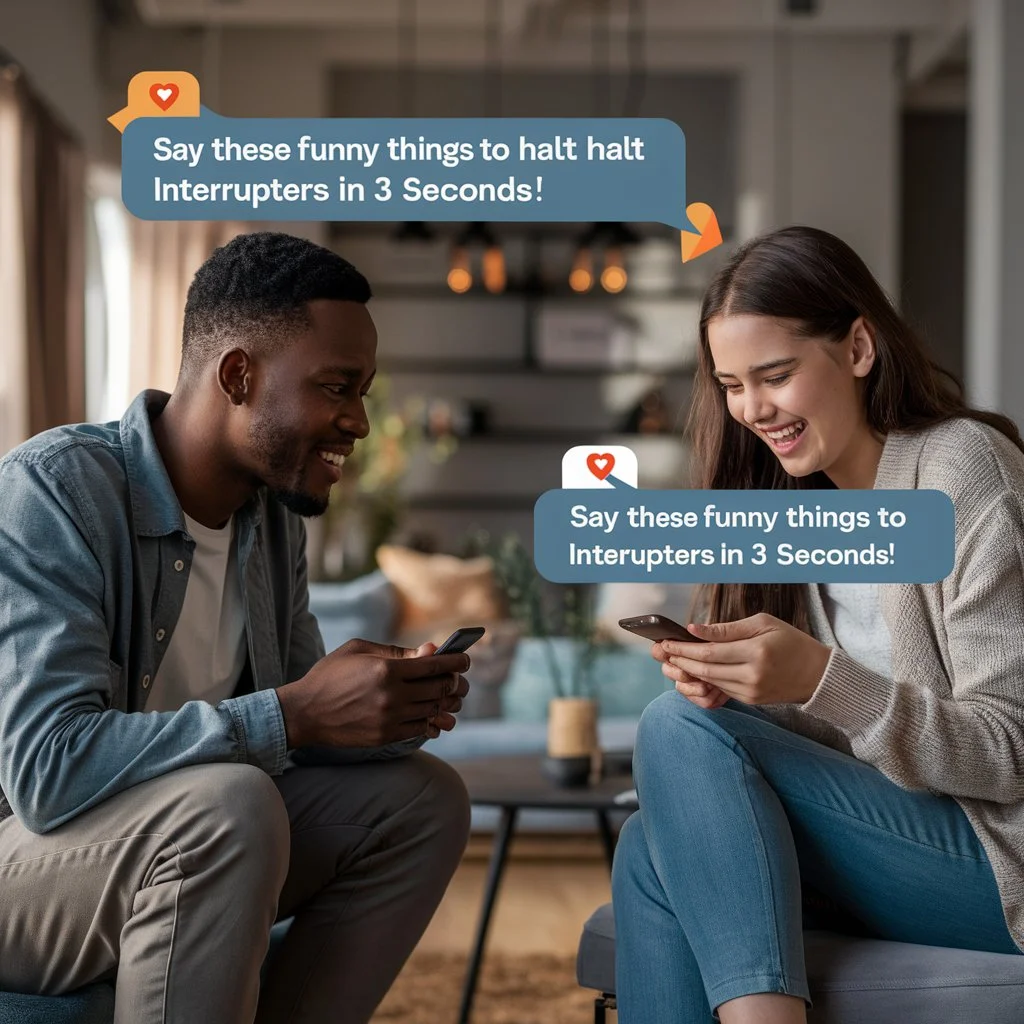Last updated on August 29th, 2024 at 04:20 pm
Dealing with interrupters can be frustrating. Whether they cut you off mid-sentence or constantly interject with their own thoughts, it’s important to have a witty arsenal to gracefully shut down their interruptions.
Here’s a collection of 30 humorous responses designed to stop interrupters in their tracks and maybe even get a laugh out of them.
“Oh, Sorry, Did the Middle of My Sentence Interrupt the Beginning of Yours?”
When someone rudely interrupts your train of thought, this response humorously flips the blame back on them. It highlights their interruption while subtly calling out their lack of courtesy. It’s a playful way to assert your right to finish your thought without escalating tension.
“I Was Saying Something Really Important… to Myself.”
This comeback suggests that whatever you were saying is so crucial, you’d rather continue it silently than be interrupted again. It injects humor into the situation while making it clear that their interruption wasn’t appreciated”Hold That Thought – I Need a Minute to Care.”
By pretending to pause for a moment of caring, you humorously dismiss their interruption. It playfully implies that their input isn’t a priority, without being outright confrontational.
“Shhh… Can You Hear That? It’s the Sound of Me Not Caring.”
This response uses sarcasm to make light of their interruption. It’s direct and to the point, emphasizing your disinterest in what they have to say without getting too confrontational.
“Just Letting You Finish Because I Respect the Garbage Coming Out of Your Mouth.”
A humorous way to acknowledge their interruption while subtly mocking the content of their speech. It uses irony to highlight the interruption and inject humor into the conversation.
“Wow, Your Ability to Interrupt Me Mid-Thought is Truly Impressive.”
This response sarcastically praises their interrupting skills, making light of the situation while subtly pointing out their rude behavior.
“Hold On, I Lost Interest in What You Were Saying Five Interruptions Ago.”
By jokingly claiming to have lost interest, this response humorously suggests that their interruptions have made their point irrelevant. It lightly rebukes their behavior while maintaining a playful tone.
“If Interrupting Were a Sport, You’d Be an Olympic Champion.”
This witty comeback compares their interrupting behavior to a competitive sport, humorously acknowledging their frequent interruptions in a lighthearted manner.
“Sorry, I Didn’t Realize the Middle of My Sentence Interrupted the Beginning of Yours.”
Turning the tables by pretending their interruption was actually your fault, this response humorously highlights their rudeness while keeping the tone light and humorous.
“Please Proceed, I Find Your Lack of Manners Fascinating.”
Using a polite tone to humorously point out their lack of manners, this response gently calls out their behavior while adding a touch of sarcasm.
“Wait, I Was Speaking? My Bad, I Thought You Were Monologuing.”
This response humorously suggests that their interruption made it seem like they were the only one talking. It gently points out their dominating behavior while injecting a touch of humor.
“Sorry, My Mistake – I Thought This Was a Conversation, Not a Monologue.”
Similar to the previous response, this comeback emphasizes the difference between a conversation and a one-sided monologue. It playfully nudges them to listen as well instead of just talking over you.
“Let Me Guess, You Were Just Dying to Tell Me Something Incredibly Unimportant?”
This response humorously suggests that their interruption was for something trivial or unimportant. It lightens the mood while gently poking fun at their interruption.
“I Didn’t Realize You Were Conducting a Rude-Off Contest.”
By framing their interruption as part of a rude behavior competition, this response humorously highlights their lack of manners while keeping the tone light-hearted.
“Hold That Thought – I Need to Stop Caring Immediately.”
Similar to earlier responses, this comeback suggests that their interruption is so uninteresting that you immediately lose interest. It humorously dismisses their input without being confrontational.
“Pardon Me, Did the Sound of Me Not Caring Interrupt the Sound of You Speaking?”
This witty response suggests that their interruption is met with your deliberate disinterest. It humorously turns their interruption into a joke about their lack of consideration.
“Sorry, Were You Saying Something? I Was Too Busy Not Caring.”
A direct and humorous way to dismiss their interruption, this response emphasizes your disinterest in what they have to say in a lighthearted manner.
“Oh, I Didn’t Realize You Were the Only One Allowed to Speak Here.”
This comeback humorously points out their dominating behavior by suggesting they believe only their voice matters. It gently rebukes their interruption while adding a touch of humor.
“Sorry, I Was Just Trying to Find the Mute Button for Your Voice.”
A playful response that suggests their interruption was so unwelcome, you’d rather silence them. It uses humor to emphasize their interruption without escalating the situation.
“Please Continue, Your Ability to Interrupt Is Truly Admirable.”
This response humorously praises their interrupting skills, turning their interruption into a compliment that gently points out their behavior.
These responses blend humor with assertiveness, making them effective in diffusing interruptions while maintaining a light-hearted tone. Let me know if you’d like to continue with more responses or if there are any adjustments you’d like to make!
“Hang On, Let Me Grab My ‘Nobody Asked’ Sign.”
This response humorously suggests that their input was unsolicited and unwelcome. It playfully dismisses their interruption while injecting humor into the situation.
“In Case You Haven’t Noticed, I’m Practicing the Ancient Art of Not Giving a…”
This response humorously suggests that their interruption hasn’t affected your indifference to their input. It uses humor to emphasize your disinterest without being confrontational.
“Wait, Did I Hear You Right? No? Oh Well, Doesn’t Matter.”
This comeback humorously dismisses their interruption by suggesting that their input wasn’t significant enough to register. It lightly rebukes their behavior while keeping the tone light-hearted.
“Let Me Guess, You Must Be the Mayor of Interruptsville.”
By playfully assigning them a title that reflects their interrupting behavior, this response humorously points out their tendency to interrupt without escalating the situation.
“Oh, Did You Say Something? I Was Just Admiring the Silence.”
This response humorously suggests that their interruption interrupted a moment of peace and quiet. It lightens the mood while gently highlighting their interruption.
“Congratulations, You’ve Officially Won the Interrupting Olympics.”
Similar to earlier responses, this comeback humorously praises their interrupting skills as if they were in a competition. It playfully acknowledges their behavior while adding humor to the conversation.
“Let Me Write That Down… Oh Wait, It Wasn’t Worth Remembering.”
This response humorously suggests that their input wasn’t memorable or important enough to be noted down. It gently dismisses their interruption while injecting humor into the situation.
“Sorry, I Didn’t Realize You Were Appointed Speaker of the Interrupting House.”
By humorously assigning them a fictional role related to their interrupting behavior, this response gently points out their behavior while keeping the tone light-hearted.
“Please, Tell Me More About How My Words Are Inconvenient for You.”
This comeback humorously suggests that their interruption was due to their inconvenience with your words. It lightly rebukes their behavior while adding a touch of sarcasm.
“Oh, Were You Interrupting Me to Say Something? How Novel.”
This witty response humorously suggests that their interruption was predictable or unoriginal. It playfully dismisses their interruption while adding humor to the conversation.

James Wilson is the creative mind behind ReplySwift.com. With a talent for crafting quick and clever responses, James helps others communicate more effectively. On ReplySwift.com, he shares tips, templates, and insights to make every reply impactful and engaging. Join James and elevate your response game to new heights.












